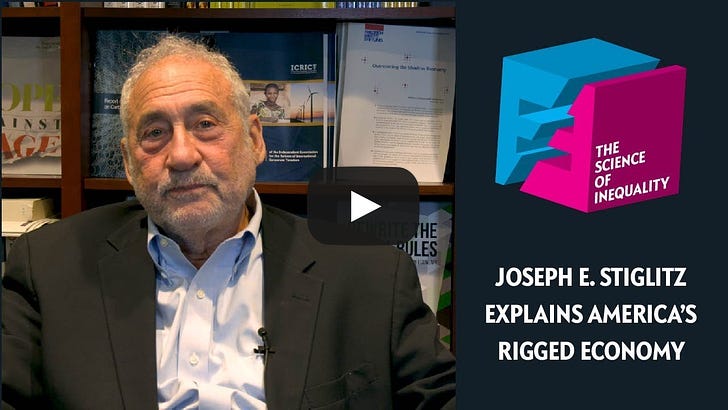Is The U.S. Economy "Rigged" In Favor Of The Wealthy & Against The Poor & Middle Class?
Welcome to The Poverty Trap: Why the Poor Stay Poor in America. I’m thrilled that you signed up to read my newsletter, and I hope that you will enjoy participating in our community. Everyone deserves the opportunity to thrive in our country, and we can work together to make that happen. Please share this newsletter with your friends and family when you have a spare minute. Thanks! If you have the means, do upgrade your subscription to Paid—your financial support of my writing will help me to continue and expand the newsletter!
Is The U.S. Economy "Rigged" In Favor Of The Wealthy & Against The Poor & Middle Class?Rude Spoiler Alert: Yes, But We Can Change ItI have been inspired by many of the speakers at the Democratic National Convention this week and was particularly taken with Former First Lady Michelle Obama’s discussion of inequality. The line that rang true for me and millions of others is likely to be remembered for a long time:
I'll explore this topic and the power of her words in a separate post deserving of its importance, but for now, I’m sharing a popular piece I wrote earlier this year that addresses our economic system and how it might just be “rigged” in favor of the wealthy. Enjoy the read and please spend some time exploring the archives of The Poverty Trap: Why The Poor Stay Poor In America. FEB 28, 2024 This post goes out to both free and paid subscribers, but if you are not already a paid subscriber and value this effort and our growing community, please consider upgrading to a paid membership. Thanks in advance for your financial support of my work —it’s what allows me to keep researching and writing. “When asked what drives the economy, many Americans have a simple, single answer that comes to mind immediately: “greed.” They believe the rich and powerful have designed the economy to benefit themselves and have left others with too little or with nothing at all.” The New York Times, February 21, 2024 I was checking out at a grocery the other day during a time when almost no other customers were in the store. While the cashier was scanning my eight cans of a rare brand of cod pate (for my elderly cat), she was chatting with two other employees, one of whom was using a wheelchair. This woman was incredibly frustrated at her boss who kept scheduling her for too many work hours, even though she had told her many times that she was receiving disability payments and could not earn over a certain amount of money without cutting her benefits or losing them entirely. I understand that being able to work full time and still receive full disability payments each month doesn’t make sense, but the government sets incredibly low limits on how much a disabled and/or poor person can earn and still receive benefits like disability payments, food stamps, health care and home heating and cooling assistance. And these limits are still based on antiquated notions of what amount of money it takes to survive in the United States today and what amounts the poor and disabled should be given, lest they get too comfortable. The recent New YorkTimes opinion piece quoted above is written by two researchers and authors who both hold positions at the American Academy of Arts & Sciences. Catherine J. Kramer, who co-wrote the Times piece and was one of several authors of an extensive report for the Academy titled: “Reimagining Our Economy”1 suggests these “benefit cliffs” as they’re called, be modified to transition people to fully support themselves before 100% of the benefits are ripped away. An example the researchers used is the earnings cut-off associated with Medicaid. In Kansas, the top amount a family of four can earn and still receive Medicaid is $39,900. I’m pretty sure with today’s cost of housing and groceries, a family of one couldn’t make it anywhere on just under $40,000, but earning even $1 more than $39,900 kicks that four-person family off of what is basically free health insurance. While the Affordable Care Act likely would provide premium subsidies, they would still have doctor visit and prescription co-pays, and a hefty deductible before insurance provided coverage. If we want an economic system that is less “rigged” against the majority of Americans, the “Reimagining Our Economy” report provides a recommendation:
The Poverty Trap has discussed the idea that our economy is purposefully skewed to favor corporations and wealthy individuals through its laws and policies. I explained in my “About” page and in numerous posts over the last two-plus years what I mean when I used the term “rigged”, and credit Senator Bernie Sanders and for helping me better understand how our economic, political and legal systems are set up to benefit the wealthy and let the poor and middle class fend for themselves. Here’s a brief explanation about how the U.S. economy actually increases inequality, and the ramifications of these laws and policies from Nobel Laureate, Joseph E. Stiglitz. The video was published in 2018 by Scientific American.  “It’s very hard to have sustained growth without shared prosperity.” Joseph E. Stiglitz, 2001 winner of the Nobel Prize in Economics. There are other ways, in addition to our reticence to help the poor, that our government’s policies not only condone but support inequality. Another issue that has been much discussed in recent years is the soaring pay gap between the CEO’s of major companies and those companies’ average workers. According to a CBS News MoneyWatch report published in September of last year:
What’s startling about these statistics, particularly how CEO pay and benefits soared during the pandemic while many of us were hurting financially and depending on government help, is that during 2021 when the pay gap was at its highest and CEO’s were taking home a whopping 399 times more than their average worker, a cry rose from conservatives in general, and businesses in particular, to cut government aid to individuals. And that is exactly what happened. Three types of expanded unemployment benefits ended in September of 2021 and were not renewed. In fact, many states, including Ohio, stopped the extra unemployment benefits several months before the program officially ended in early September, 2021, and returned the money to the federal government rather than allow unemployed workers a few extra bucks that were already allotted to them — and it wasn’t even the states’ money! And we haven’t even touched the lopsided tax code that has for over half a century, allowed both corporations and the wealthiest individuals to pay a lower federal tax rate than their salaried employees, including the administrative assistants and secretaries without whom their businesses wouldn’t be able to function. Or taxpayer money that subsidizes every move corporations make, so they will be sufficiently incentivized to expand their businesses and create more low-paying jobs. On the other hand, those who represent business interests claim corporate subsidizes allow the government to nudge business in the direction it wants it to go, like creating lower cost housing and green energy alternatives. But to the tune of well over $100 billion annually? So what can we do both individually and collectively to “unrig” our system and lessen the gap between the rich and everyone else? It starts with understanding the issues that affect our economy, like those discussed here, and then doing a little research on our current elected officials at every level. Where do they stand on these issues and what specific actions have they taken to “even the playing field” for those without substantial money or power? If their actions in office don’t line up with what we’ve learned is necessary to close the wealth gap, then vote them out, and vote in people with compassion and the smarts to see we allhave to thrive, that sustained economic growth depends on shared prosperity, as the economist Joseph Stiglitz said. Together, we have to make it clear to our current elected officials, or the next generation we allow to govern us, that they and our government are here to serve and promote the common good, not special interests. ________________________________________________________ Do you think our economic system is “rigged” or purposely designed to benefit the wealthy and corporations at the expense of the rest of us? What can we do to level the playing field and close the wealth and inequality gap? Please share your thoughts in the Comment Section below—thanks! And if you are not already a subscriber, don’t forget to sign up for a free or paid subscription to The Poverty Trap! You’re on the free list for The Poverty Trap: Why the Poor Stay Poor In America. All posts are free for now, but if you’d like to join the crowd, please support my work by becoming a paid subscriber. |
Older messages
Podcast app setup
Monday, August 12, 2024
Open this on your phone and click the button below: Add to podcast app
Podcast app setup
Thursday, August 8, 2024
Open this on your phone and click the button below: Add to podcast app
Rents Are Still Rising, Corporate Landlords Are Getting Richer And Tenants Are Getting...Sicker?
Thursday, August 8, 2024
Listen now (10 mins) | Yes, Sicker. ͏ ͏ ͏ ͏ ͏ ͏ ͏ ͏ ͏ ͏ ͏ ͏ ͏ ͏ ͏ ͏ ͏ ͏ ͏ ͏ ͏ ͏ ͏ ͏ ͏ ͏ ͏ ͏ ͏ ͏ ͏ ͏ ͏ ͏ ͏ ͏ ͏ ͏ ͏ ͏ ͏ ͏ ͏ ͏ ͏ ͏ ͏ ͏ ͏ ͏ ͏ ͏ ͏ ͏ ͏ ͏ ͏ ͏ ͏ ͏ ͏ ͏ ͏ ͏ ͏ ͏ ͏ ͏ ͏ ͏ ͏ ͏ ͏ ͏ ͏ ͏ ͏ ͏ ͏ ͏ ͏ ͏ ͏
Red States Continue To Turn Down Federal Money, And Their Residents Suffer Because Of It.
Tuesday, July 23, 2024
Listen now (12 mins) | Yet They Still Vote Republican... ͏ ͏ ͏ ͏ ͏ ͏ ͏ ͏ ͏ ͏ ͏ ͏ ͏ ͏ ͏ ͏ ͏ ͏ ͏ ͏ ͏ ͏ ͏ ͏ ͏ ͏ ͏ ͏ ͏ ͏ ͏ ͏ ͏ ͏ ͏ ͏ ͏ ͏ ͏ ͏ ͏ ͏ ͏ ͏ ͏ ͏ ͏ ͏ ͏ ͏ ͏ ͏ ͏ ͏ ͏ ͏ ͏ ͏ ͏ ͏ ͏ ͏ ͏ ͏ ͏ ͏ ͏ ͏ ͏ ͏ ͏ ͏
A Holiday & Weekend Reading List...
Friday, July 5, 2024
Listen now (11 mins) | It's All About Giving Back To Our Communities. ͏ ͏ ͏ ͏ ͏ ͏ ͏ ͏ ͏ ͏ ͏ ͏ ͏ ͏ ͏ ͏ ͏ ͏ ͏ ͏ ͏ ͏ ͏ ͏ ͏ ͏ ͏ ͏ ͏ ͏ ͏ ͏ ͏ ͏ ͏ ͏ ͏ ͏ ͏ ͏ ͏ ͏ ͏ ͏ ͏ ͏ ͏ ͏ ͏ ͏ ͏ ͏ ͏ ͏ ͏ ͏ ͏ ͏ ͏ ͏ ͏ ͏ ͏ ͏
You Might Also Like
Win Two Tickets To A Major Music Festival & A Shopping Spree!
Thursday, February 27, 2025
Thanks To Marshalls. Feb. 27, 2025 Bustle Daily Enter To Win Tickets To A Major Music Festival, Thanks To Marshalls Presented by Marshalls Enter To Win Tickets To A Major Music Festival, Thanks To
Cat Story
Thursday, February 27, 2025
How we got that cat ͏ ͏ ͏ ͏ ͏ ͏ ͏ ͏ ͏ ͏ ͏ ͏ ͏ ͏ ͏ ͏ ͏ ͏ ͏ ͏ ͏ ͏ ͏ ͏ ͏ ͏ ͏ ͏ ͏ ͏ ͏ ͏ ͏ ͏ ͏ ͏ ͏ ͏ ͏ ͏ ͏ ͏ ͏ ͏ ͏ ͏ ͏ ͏ ͏ ͏ ͏ ͏ ͏ ͏ ͏ ͏ ͏ ͏ ͏ ͏ ͏ ͏ ͏ ͏ ͏ ͏ ͏ ͏ ͏ ͏ ͏ ͏ ͏ ͏ ͏ ͏ ͏ ͏ ͏ ͏ ͏ ͏ ͏ ͏ ͏ ͏ ͏ ͏ ͏ ͏ ͏
Selena Gomez Just Won The Red Carpet At The 2025 BAFTAs In An Iconic Gown
Thursday, February 27, 2025
WOW. The Zoe Report Daily The Zoe Report 2.16.2025 Selena Gomez Won The Red Carpet At The 2025 BAFTAs In An Iconic Gown (Red Carpet) Selena Gomez Won The Red Carpet At The 2025 BAFTAs In An Iconic Gown
"European" Means "I Want To Walk"
Thursday, February 27, 2025
When we mistake concrete ideas for abstract ones ͏ ͏ ͏ ͏ ͏ ͏ ͏ ͏ ͏ ͏ ͏ ͏ ͏ ͏ ͏ ͏ ͏ ͏ ͏ ͏ ͏ ͏ ͏ ͏ ͏ ͏ ͏ ͏ ͏ ͏ ͏ ͏ ͏ ͏ ͏ ͏ ͏ ͏ ͏ ͏ ͏ ͏ ͏ ͏ ͏ ͏ ͏ ͏ ͏ ͏ ͏ ͏ ͏ ͏ ͏ ͏ ͏ ͏ ͏ ͏ ͏ ͏ ͏ ͏ ͏ ͏ ͏ ͏ ͏ ͏ ͏ ͏ ͏ ͏ ͏ ͏
Sketched Buk Brings the Brilliance of Gold to Bangkok
Thursday, February 27, 2025
Thailand's Buk overcomes challenges to make glass gilding an important part of his design practice. BLAG Magazine: Adventures in Sign Painting Craft, Community & Culture Sketched Buk Brings the
Have You Seen the Panda Cam? 🐼
Thursday, February 27, 2025
— Check out what we Skimm'd for you today February 17, 2025 Subscribe Read in browser Header Image But first: the best Presidents Day sales to shop today Update location or View forecast
“The Lord is American” by W. J. Lofton
Thursday, February 27, 2025
The world undresses / its wounds. It wounds. ͏ ͏ ͏ ͏ ͏ ͏ ͏ ͏ ͏ ͏ ͏ ͏ ͏ ͏ ͏ ͏ ͏ ͏ ͏ ͏ ͏ ͏ ͏ ͏ ͏ ͏ ͏ ͏ ͏ ͏ ͏ ͏ ͏ ͏ ͏ ͏ ͏ ͏ ͏
Jeff Bezos Makes a Damning Case Against Corporate Media
Thursday, February 27, 2025
The decision to exile dissenting views from the Post opinion pages shows he puts Amazon's business over journalism ͏ ͏ ͏ ͏ ͏ ͏ ͏ ͏ ͏ ͏ ͏ ͏ ͏ ͏ ͏ ͏ ͏ ͏ ͏ ͏ ͏ ͏ ͏ ͏ ͏ ͏ ͏ ͏ ͏ ͏ ͏ ͏ ͏ ͏ ͏ ͏ ͏ ͏ ͏ ͏ ͏
Fit Is Better Than Thin
Thursday, February 27, 2025
The fit versus fat debate, cold plunging, new tech and your recommendations. ͏ ͏ ͏ ͏ ͏ ͏ ͏ ͏ ͏ ͏ ͏ ͏ ͏ ͏ ͏ ͏ ͏ ͏ ͏ ͏ ͏ ͏ ͏ ͏ ͏ ͏ ͏ ͏ ͏ ͏ ͏ ͏ ͏ ͏ ͏ ͏ ͏ ͏ ͏ ͏ ͏ ͏ ͏ ͏ ͏ ͏ ͏ ͏ ͏ ͏ ͏ ͏ ͏ ͏ ͏ ͏ ͏ ͏ ͏ ͏ ͏ ͏
Why Does The Bad Guy Feel Like The Victim?
Thursday, February 27, 2025
Thoughts on the psychology of sympathizing with petty wrongdoers ͏ ͏ ͏ ͏ ͏ ͏ ͏ ͏ ͏ ͏ ͏ ͏ ͏ ͏ ͏ ͏ ͏ ͏ ͏ ͏ ͏ ͏ ͏ ͏ ͏ ͏ ͏ ͏ ͏ ͏ ͏ ͏ ͏ ͏ ͏ ͏ ͏ ͏ ͏ ͏ ͏ ͏ ͏ ͏ ͏ ͏ ͏ ͏ ͏ ͏ ͏ ͏ ͏ ͏ ͏ ͏ ͏ ͏ ͏ ͏ ͏ ͏ ͏ ͏ ͏ ͏ ͏ ͏

